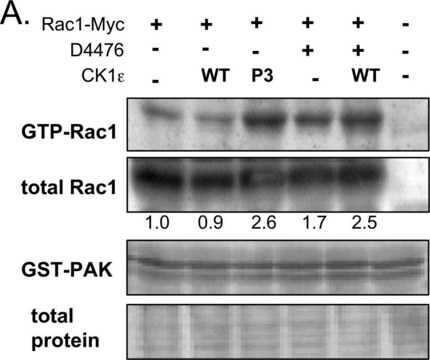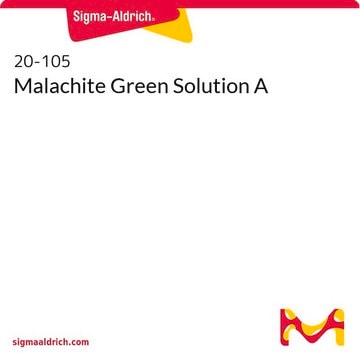MABT27
Anti-LIBS2 epitope (Integrin beta3 subunit) Antibody, clone ab62
clone ab62, from mouse
Sinónimos:
LIBS2 domain, Integrin, Integrin alphaVbeta3, LIBS2 epitiope
Seleccione un Tamaño
479,00 €
Seleccione un Tamaño
About This Item
479,00 €
Productos recomendados
origen biológico
mouse
Nivel de calidad
forma del anticuerpo
purified immunoglobulin
tipo de anticuerpo
primary antibodies
clon
ab62, monoclonal
reactividad de especies
human
técnicas
flow cytometry: suitable
western blot: suitable
isotipo
IgG2aκ
Condiciones de envío
wet ice
modificación del objetivo postraduccional
unmodified
Información sobre el gen
human ... ITGB3(3690)
Descripción general
Clone Ab62 is a monoclonal antibody that specifically recognizes the LIBS2 epitope in the C-terminal region of the extracellular domain of the beta3 subunit (Wiberzbicka-Patynowski, I., et al. (1999). JBC. 274(53):37809-37814).
Especificidad
Inmunógeno
Aplicación
Cell Structure
Integrins
Calidad
Western Blot Analysis: 0.5 µg/mL of this antibody detected LIBS2 domain of integrin beta3 subunit in 10 µg of human platelets cell lysate.
Descripción de destino
Other MW bands may vary or may be observed depending on lysate used and if the LIBS2 epitope is present in other proteins.
Forma física
Almacenamiento y estabilidad
Nota de análisis
Human platelets cell lysate
Otras notas
Cláusula de descargo de responsabilidad
¿No encuentra el producto adecuado?
Pruebe nuestro Herramienta de selección de productos.
Código de clase de almacenamiento
12 - Non Combustible Liquids
Clase de riesgo para el agua (WGK)
WGK 1
Punto de inflamabilidad (°F)
Not applicable
Punto de inflamabilidad (°C)
Not applicable
Certificados de análisis (COA)
Busque Certificados de análisis (COA) introduciendo el número de lote del producto. Los números de lote se encuentran en la etiqueta del producto después de las palabras «Lot» o «Batch»
¿Ya tiene este producto?
Encuentre la documentación para los productos que ha comprado recientemente en la Biblioteca de documentos.
Filtros activos
Nuestro equipo de científicos tiene experiencia en todas las áreas de investigación: Ciencias de la vida, Ciencia de los materiales, Síntesis química, Cromatografía, Analítica y muchas otras.
Póngase en contacto con el Servicio técnico







